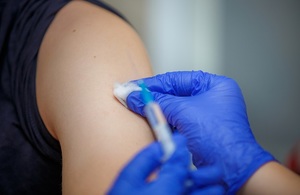Government to add COVID-19 to Vaccine Damage Payments Scheme
The government is taking this precautionary step in advance of a rollout of an authorised COVID-19 vaccine and in line with other immunisation programmes.

- COVID-19 vaccines will only be deployed once they meet strict standards of safety, effectiveness and quality and are approved for use by the regulator
- No safety concerns have been reported in clinical trials for COVID-19 vaccines authorised for use
- Addition of COVID-19 a responsible step and standard process to further prepare for safe roll out
In advance of a rollout of an authorised COVID-19 vaccine and in line with other immunisation programmes, the government is taking the precautionary step to ensure that, in the very rare possibility where someone is severely disabled as a result of taking a COVID-19 vaccine, they can access financial assistance through the Vaccine Damage Payments Scheme (VDPS).
No safety concerns have been reported in vaccines authorised for use following rigorous clinical trials involving tens of thousands of people and extensive analysis of the vaccine’s safety, quality and effectiveness by experts from the Medicines and Healthcare products Regulatory Agency (MHRA).
Pfizer/BioNTech’s vaccine is now the first COVID-19 vaccine to be authorised for use in the UK, and the MHRA will keep safety under continual review.
Adding diseases to the VDPS is not new and numerous diseases have been added as successive governments have rolled out more immunisation programmes, such as HPV and Meningitis B. In response to the H1N1 (swine flu) pandemic, the previous government added swine flu to the VDPS on 10 October 2009.
Generally, only those who were administered vaccines as part of a childhood immunisation programme are covered under the VDPS. However, because COVID-19 vaccines will be rolled out to a large proportion of the adult population, the government will amend the eligibility requirements, ensuring adults who are administered a COVID-19 vaccine in the UK or Isle of Man, or as part of an armed forces medical treatment, will be covered by the scheme too.
This is not a novel approach. Currently, polio, rubella, meningococcal group C, HPV and meningococcal group W (up to age 26) are also exempt from the age requirement, as these vaccines were primarily offered to adults.
Deputy Chief Medical Officer for England Professor Jonathan Van-Tam said:
We are extremely confident in the effectiveness and safety of our immunisation programmes. We will not be rolling out a COVID-19 vaccine unless it has met robust standards of safety, effectiveness and quality and authorised for use by the medicines regulator, the MHRA.
The UK has one of the most comprehensive immunisation programmes in the world, and sensible routine precautions such as these form a huge part of our global-leading standards in safety.
The VDPS is a safety net to help ease the burden on individuals who have in extremely rare circumstances experienced harm due to receiving a government-recommended vaccine. It is not a compensation scheme. Rather, it provides a one-off, tax-free lump sum – currently £120,000 – for those suffering a severe disability as a result of a vaccine against a disease listed under the Vaccine Damage Payments Act.
Background information
Currently, in order to qualify for the payment, it must be accepted, on the balance of probability, that there is a causal link between the vaccine and the claimed disability and that the resulting disability amounts to severe (ie at least 60%) disablement.
Claims are assessed and paid where successful by the Department for Work and Pensions.